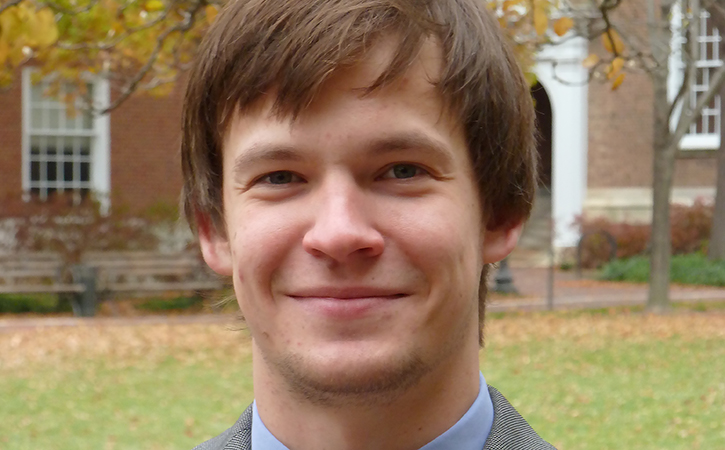Peter Kalugin ’11

The next 10 years of Peter Kalugin’s life are mapped out: off to study oncology at Oxford as a 2015 Rhodes Scholar, then straight into eight years of graduate work at Harvard Medical School for an aggressive educational mash-up of application and research, all working toward the goal of specializing in pediatric cancer by the ripe, young age of 32.
But even Kalugin ’11, who hails from a family of scientists — ”mainly physicists” — and professes with a gentle, self-deprecating laugh to be ”interested in everything,” might recognize that there’s room in a decade for plans to shift. After all, it was unpredictability that first drew him to study oncology.
”Everybody has a personal story related to [cancer], but from a standpoint of science, to me what’s most exciting about [oncology] is how diverse and how varied it is,” Kalugin says, not long after his graduation from Johns Hopkins University’s Krieger School of Arts & Sciences with a degree in molecular and cellular biology and mathematics and a minor in physics.
”Under this umbrella of ’cancer,’ it’s a thousand different diseases that look similar but behave differently,” he says. ”It’s a cell that has lost control, and it can lose control in so many ways. … How does one cell know how to become a whole human body? It’s a complex process that can go wrong at any point.”
Originally from Russia, Kalugin’s family settled in Albuquerque, New Mexico, where his father teaches physics. There, the son’s passion for the orderly, rule-abiding world of mathematics grew beyond the opportunities of his academic community. Enter Exeter. Kalugin applied to the one-year program and was one of two seniors admitted in 2010.
He lived in Williams House with the postgrads and two-year seniors, not quite within ”the Exeter bubble,” but certainly immersed in the philosophy of communal learning and educational exploration, right down to his roommate.
”My roommate, Zachary Hodges ’11, had a huge influence on me,” Kalugin says. ”He just signed with the [NFL’s Indianapolis] Colts coming from Harvard football, and he had a very different reason and background for coming to Exeter. Coming from different social, religious, and geographic settings, we bonded over how committed we each were to our own ideals. It was surprising that we even got along because I feel like the odds were against us, but we bonded over this general love of arguing. I feel like we both learned a lot from that.”
The role of community — being both within and without — is a prominent theme in Kalugin’s life. Before New Mexico, his family lived in Germany and Switzerland. ”It was not always pleasant to be a Russian in Western Europe,” he recalls. ”But looking back, I wouldn’t trade it for anything. It was an important experience to go through… how to meet other cultures and assimilate but still retain some individuality in the process. And once I started realizing that it was actually valuable, I began really enjoying that experience.”
He loosened the reins on his scientific interests as well. He found his initial love of the orderly, aesthetic patterns of math, physics and music morphing from ”things that fit together very well to things that fit together, but not perfectly.”
”Even though there are all these logical rules governing [biology],” Kalugin notes with enthusiasm, ”nature has this ability to mess with some of these rules and come up with very different results using the same rules. In biology, anything can happen.”
Which brings us back to Kalugin’s 10-year-plan. ”It’s going to be a matter of just learning how to have ideas, which has been the most daunting thing, really,” he admits. ”Reading books isn’t that difficult, but having new ideas about things that haven’t been done before is kind of scary. We’ll see how that goes.”
A fair bet is that it will go in exciting and unpredictable ways.